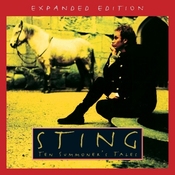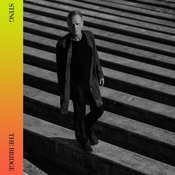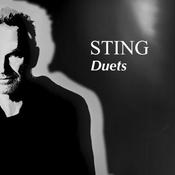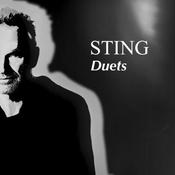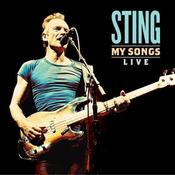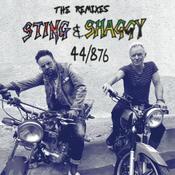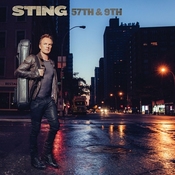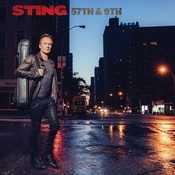The Last Ship (super deluxe package)
- The Last Ship lyrics
- Dead Man's Boots lyrics
- And Yet lyrics
- August Winds lyrics
- Language Of Birds lyrics
- Practical Arrangement lyrics
- The Night The Pugilist Learned How To Dance lyrics
- Ballad Of The Great Eastern lyrics
- What Have We Got? (featuring Jimmy Nail) lyrics
- I Love Her But She Loves Someone Else lyrics
- So To Speak (featuring Becky Unthank) lyrics
- The Last Ship (Reprise) lyrics
- Shipyard (featuring Jimmy Nail, Brian Johnson and Jo Lawry) lyrics
- It's Not The Same Moon lyrics
- Hadaway lyrics
- Jock The Singing Welder lyrics
- Sky Hooks And Tartan Paint (featuring Brian Johnson) lyrics
- Peggy's Song (featuring Rachel Unthank) lyrics
- Show Some Respect lyrics
- Practical Arrangement (Full original duet, featuring Jo Lawry) lyrics

Soundbites
"You can't use 30 songs in a musical theatre production. It doesn't need it. So I have a lot of excess songs. And that process is interesting because every song will fight for its life; every couplet fights for its life; every verse fights for its life; every refrain, every bridge. Unless it's moving the story forward, moving the narrative forward, they get rid of it. And that's kind of cruel and painful if you've spent a lot of time writing a song and crafting a song."
Sting, The Journal
"There were no clues in my environment that you leave that environment and fare well and be successful. My parents didn't really understand what my dreams were, they just thought I was crazy, because I had just given up a job with a pension and the security, in their eyes. My dad really didn't understand till the end of his days what the hell I was doing. He though that I should have had a proper job. Maybe he was right. I wanted to take a risk and be a star. I don't know where I got the confidence from. I just got lucky."
Sting, Associated Press
"A good song can last for three minutes and you're just expressing one emotion. You can't have that in the theater. The narrative needs to be advanced as the song is being sung."
Sting, Associated Press
"I used the dialect that I was raised in. I only ever use it now when I threaten people or when I get really angry. My kids would always know I was serious when I start speaking in the weird voice. They're like, 'Uh-oh, he's speaking in that weird voice, he must mean it.'"
Sting, Associated Press
"It's set in my home town.my earliest memory is of a massive ship, we built the greatest, biggest ships ever constructed from planet Earth at the end of my street. I would watch these things grow and I used to wonder if I was gonna have to end up there. I took up music, realised that was a way to escape. Now I have this huge passion and urge, to go back and try and figure out what it was that I was born into because it was quite a surreal landscape and a very powerful and symbolic one, so as an artist it is your duty to return, at least in a creative way and give that place honour."
Sting, CNN
"I wanted... the music to reflect the musical richness of the culture in the North East which was very rich. It has an original Northumbrian music, kind of Celtic. The history of Northumbrian music is very rich. In the 19th century there was a massive Scottish immigration and then a huge Irish immigration so I was brought up in an Irish community, a Catholic community and so that music added to the texture and . of course rock n roll. so this music reflects all of those influences. There is not much rock n roll in it. It's a mixture of folk music and a tip of the hat to musical theatre."
Sting, CNN
"It's a kind of paradox writing about other people but then really ending up writing about yourself and your own conflicted feelings about where you come from. But obviously there are elements of me in it - not least the name. I mean, I chose the name Gideon unconsciously, and it's very close to the name I was given - although no one ever calls me that... I'm hiding in plain sight here. He is an exile, he's very ambivalent about where he comes from. He comes back under duress. And yet he finds himself in the spirit of community, in actually belonging. So yeah, there's something of me there. Not entirely. But there's something of me in all of these characters."
Sting, Irish Independent
"If you are being truthful when you write, all of that just comes out. It's like a stream of consciousness. Like being on Freud's couch. It just comes out when you are telling a story. Which is probably the value of story. It allows us to understand ourselves, our history. I've come from a family of disappointed romantic love and I think that's one of the things I'm sorting out. My parents' marriage was a nightmare and I think that's what I'm excavating. Which is not exactly comfortable."
Sting, Irish Independent
"I'd been wondering whether I'd lost the mojo. But it turns out I just needed to stop writing about me. Once I said, 'OK, I'm gonna tell somebody else's story,' I freed up and the songs poured out in a very quick way. You need to be on input some of the time, to have something to say before you say it."
Sting, The Los Angeles Times
"I was writing songs for other characters than me, other sensibilities than mine, a different viewpoint and so all of that pent-up stuff, all of those crafts I'd developed as a songwriter, I was suddenly free to explore without much thinking, actually. It just kind of came out as a kind of Tourette's, a kind of projectile vomiting. It just came out, very quickly."
Sting, The New York Times
"The history of pop singers going into this field is littered with corpses. Every line fights for its life. Every couplet, every verse, every song, every character is constantly fighting for its life, even now. I'd write a song which I thought was fantastic - a Grammy-winning song! - and they'd say: ‘No, that's not in the play. It's not advancing the narrative. It's just expressing an emotion, and the narrative is static for three, four minutes. You can't afford that length of time.'"
Sting, The New York Times
"I don't think I'm romanticising very much what I experienced as a child of that community I was brought up in. It was incredibly hard and dangerous work. Actually most of the men who worked there ****ing hated it. And yet they had this enormous pride about what they built - this palpable example of their handiwork. So there's this constant ambiguity about the shipyards. They were awful, awful places, and yet they produced the biggest ships in the world, and the whole town was proud of those things."
Sting, The Sunday Telegraph
"The demise of the shipyard became a sort of useful metaphor for the demise of my parents. It had a kind of theatrical mood, but there wasn't a narrative - it was just a mood piece. I decided to have a go at trying to make a story out of it. And I read a story about some shipyard workers in Gdansk in Poland who built their own ship. I just loved that. I thought it was a really wacko, Homeric idea. And I thought: I'll weld that idea to my town."
Sting, The Sunday Telegraph
"The Soul Cages is a strange record, probably my least understood or accepted record, but it has a rolling constituency of the recently bereaved. I get a lot of letters from people who say this record gives them some solace. But then I began to think: I wonder if there's a story that we could tell, that would use The Soul Cages as their starting point and have a narrative, with characters. And this thing coincided with a very dry period for me as a songwriter. You know, I hadn't written songs in about eight years, either because I'd lost the juice or I wasn't inspired or I was afraid... I don't know. I make my living as a songwriter so it's kind of worrying when that well runs dry. And as soon as I began to think of writing for other people, for other voices, for other characters, from other viewpoints apart from my own, this stuff started to flow - because I wasn't in the way any more."
Sting, The Journal
"I was born and raised in Wallsend. It's never been a pretty place. It's a tough place. Nonetheless, I am fiercely proud of it, of being from Wallsend. The ships they built were the biggest ships ever built in the world and yet there was always an ambiguity. It was a tough life those men led. A lot of them hated the yards, but they were fiercely proud of the ships they built with their hands. I lived in Gerald Street, one of those streets leading down to Swan Hunter. That memory of the ship at the end of the street is emblazoned on my memory bank. I’d stand on the pavement and wave my Union Flag as the Queen Mother came down the street in her Rolls-Royce. She actually looked at me. I swear she did. She noticed me.”
Sting, The Journal
“You know Wallsend has had the heart taken out of it. It used to have a coal mine and it had a shipyard. That was all we had and there’s nothing now. There’s are big holes where both things were. At the same time, Newcastle is kind of thriving. It’s a big shopping centre, a big party town and a big university town. But North Tyneside is still depressed and it deserves better, frankly.”
Sting, The Sun
“It was an extraordinary environment to be brought up in. It was such a surreal landscape. These ships would literally blot out the sky. Then to watch a ship launch was a kind of apocalyptic event. You’d never see anything else that size, and the noise of it. The pride in the town was immense. The ships were the largest vessels ever constructed on the planet. The work was incredibly hard, dangerous and unpleasant, yet the workers had something palpable, ‘I did that with my hands’. I think we lack that a bit today. What do we build? What do we make? Obviously the whole community was connected to it. My great grandfather was a North Sea pilot. My grandfather was a shipwright and my father was an engineer in the big engineering works nearby. There were all kinds of master mariners in our family tree going way back.”
Sting, The Sun
“My father would always tell me to go to sea. We’d go to church on a Sunday and he’d take me down to the quayside to see the boats and he would say, ‘Go to sea. See the world’. I did get a seamen’s card but as a musician on a P&O liner. It wasn’t quite what he had in mind.”
Sting, The Sun
"I've written far more songs than would be needed in a musical - about 30 of them. What to do with those other songs? Either they weren't advancing the narrative, or the characters they were written for have evolved into something else. So why don't I present the songs in a sort of revue and bring the audience into that process? Also, by singing them you learn a great deal about how the arrangements need to be finished."
Sting, The Wall Street Journal
"I'm very keen to write earworms, things that will be catchy and will get people to leave the theatre singing. I've done that in my pop career, but at the same time I didn't want to do a rock musical. I wanted to honour the regional music of the place I come from and the tradition of musical theatre. My education wasn't just rock 'n' roll. It was the complete canon of Rodgers and Hammerstein and "My Fair Lady" and "West Side Story." As a kid I ate those records up."
Sting, The Wall Street Journal
Backgrounder
Review from All About Jazz
Much like his fellow colleague, musician Peter Gabriel, British singer and songwriter Sting has spent the past decade, since his last album with original material Sacred Love (A&M, 2003) in endless touring, reissues, cover albums and recording past material with a philharmonic orchestra. Far from being inactive or lazy, during that time he also reunited his band Police twice—once for the induction in the Rock and Roll Hall of Fame in 2003 and for a lucrative world tour in 2007/08. By his own admission, after the understated and plastic Sacred Music he had been facing a writer's block and had lost interest in writing original material, and the songs on The Last Ship are the first to arrive after a long period of drought.
These songs were written for a musical to be premiered in 2014 and that is based on the shipbuilding community of Wallsend in the Northeast of England, where Sting was born and raised. The idea for the play and its symbolism was taken from his album Soul Cages where he first explored it. The Soul Cages, (A&M, 1991) which is one of Sting's finest records, was a thematic song cycle about his hometown, a shipyard town, and the death of his father. The symbolism of the shipyards and its demise had become a metaphor for mortality. He would revisit the memories from that period from his life again in his brilliant memoir Broken Music. The liner notes of The Last Ship read that it is a tale of "slow death and redundancy of the shipyard that had loomed over my young life and the streets I played in morphed into a grim metaphor for the baleful demise of my parents." And when he introduced the idea of making a musical about shipbuilders to a Broadway producer, he was encouraged to try it, and in return that opened the ideas of creativity and desire for writing new songs.
The play's plot, for which Sting has spent three years working, is a homecoming story set during the decline of the shipbuilding industry in England and the narrative centres on labour strife and family in working class Britain. The central characters are a ship worker father and his rebellious son. And when the story's wandering protagonist returns home after 14 years abroad, he finds the shipyard's future in jeopardy and his youthful picture of the place irrevocably changed. The songs on The Last Ship brim and sparkle with lyrical ideas and ambition where Sting's poetic elegance reaches far and away places that others don't get close to. Musically, the songs are a cross between show tunes and British folk traditions, as the album is more close to the ruminative and tender nature of If on a Winter's Night (Deutsche Grammophon, 2009) than the plastic soul of Sacred Love. Sting is a seasoned song-smith with tunes that are replete with ear-worm melodies. The arrangements are simple and sparse, everything lightly touched, with only swells of strings, piano and other instrumental colours buoying up the guitar and his lush voice. The songs are liquid and amorphous, prone to shape-shifting, rarely offering up an obvious verse and chorus symmetry, or easy interpretation. Rather than writing introspective songs from his viewpoint, this time he wrote the songs from a third person characters.
Within this cycle of songs there are many highlights. "And Yet," is a playful number that is sang from a perspective of a sailor returning home wondering about a woman he left behind when he left the port while "Practical Arrangement" is a tender and unusual ballad that tells a story of an older man that tries to persuade a single young mother that they would make good housemates. The reprise version of this song is sang in a beautiful duet with Australian jazz singer Jo Lawry. "What Have We Got" is a boisterous shanty and a wonderful duet with singer Jimmy Nails. Other collaborations include guest vocals from singers Becky Unthank and Brian Johnson of AC/DC.
With The Last Ship, Sting joins in a list of artists from the world of pop music that aim for theatre stages where some have found great success and some have not. These songs where he explores the rich heritage of his past, reveal an artist in complete control of his arsenal. Sting is a rare musician whose artistry provides just the right amount of ballast to keep a ship as big as this record buoyant.
Review from All Music Guide by Stephen Thomas Erlewine
It's an open secret that Sting's interest in songwriting waned after 2003's Sacred Love, an undistinguished collection of mature pop that passed with barely a ripple despite winning a Grammy for its Mary J. Blige duet "Whenever I Say Your Name." Sting spent the next decade wandering - writing classical albums for lute, recording the frostiest Christmas album in memory, rearranging his old hits for symphony, then finally, inevitably, reuniting the Police - before finding inspiration within the confines of a musical.
The Last Ship tells the tale of a British shipyard in the '80s, one laid low by changing times, so there's naturally an elegiac undertow to Sting's originals, a sensibility underscored by his decision to ground nearly all these songs in the folk of the British Isles. Dockworkers in the '80s may not have been singing folk songs, but the genre is elastic, allowing for single-spotlight soliloquies along with rousing all-cast showcases, like the boisterous "What Have We Got?" Also, by having the bones of his songs belong to folk, Sting can put together a credible album of his own, as the songs from The Last Ship feel intimate in a way he's rarely attempted in his career. He brings in a few guests - Jimmy Nail and Becky Unthank show up on the standard edition, AC/DC's Brian Johnson, a rock & roll dockworker if there ever was one, shows up on the deluxe - but the focus is entirely on the songwriter.
Occasionally, Sting's desire to inhabit roles within the musical is a little too strong - not long into the album he adopts either a Scottish or Irish brogue, elsewhere he affects a workingman's vernacular, all the while sounding like nobody else but the posh Gordon Sumner - but his songs are precise and cannily crafted, bearing the work of a songwriter who is intent on sculpting every line and every melodic progression. Unlike Sacred Love, The Last Ship isn't listless; even when the album is quiet - which it often is - Sting is engaged, relishing the different characters that inhabit his musical and seizing the challenge of writing in the longform. It's easy to sling arrows at The Last Ship - there is a whiff of condescension to some of the blue-collar anthems, the air is often haughty ("The Night the Pugilist Learned How to Dance") - but this is Sting's tightest collection of songs in ages, and they all play off each other, adding up to a cohesive whole that is surely one of his best latter-day records.
Review from Consequence Of Sound by Tony Hardy
When you achieve a certain stature in music, it comes with full permission to indulge. Sting’s The Last Ship, his first album of original material in 10 years, is a curious indulgence, focusing on the decline and fall of the shipbuilding industry in North East England. However worthy, it’s a highly limited theme, one somewhat surprisingly doubling as a stage play of the same name destined for Broadway. Childhood memories and personal reflections can of course inform broader truths, but it would seem just as odd if a production charting the demise of Detroit’s auto industry were to open in, say, Glasgow. How close the play will follow this soundtrack remains to be seen, but the record is steeped in theatricality from the start.
Given that the U.S. struggled to understand Cheryl Cole on The X-Factor, it will be interesting to hear what the American market makes of Sting’s exaggerated Geordie accent on this collection of songs. The title track opens with the traditional rhythms of Tyneside folk, but lyrically goes beyond scene-setting. Arguably it is the album’s pivotal song, as it concerns the final ship built on the famous Swan Hunters shipyard, the very one that cast a shadow over the young Gordon Sumner’s family home, the one that made such a big impression on him. The singer’s semi-autobiographical rejection of following his father into the shipbuilding trade in “Dead Man’s Boots” is delivered with genuine passion, but from then on theatrical artifice takes over.
Nonetheless, there are a couple of standouts that you can easily visualize working on stage. The simple confessional of “Practical Arrangement” is pure Sondheim, while Sting’s bawdy duet with fellow Geordie Jimmy Nail on the shanty “What Have We Got” provides a raucous set piece. Less successful is the “Ballad Of The Great Eastern”, whose rhymes evoke the lyric school of Rick Wakeman. The best is saved for the end, with “So To Speak”. Sting’s shipyard worker at the end of his life gives a graphically eloquent last testimony before he is joined by the brittle and beautiful tones of Becky Unthank, whose female perspective also puts a break on over-sentimentality. It ends with a glorious resolution of two notes teased from Northumbrian pipes, so perfect and final that the reprise of “The Last Ship” seems redundant. Such honest moments make this album a worthwhile, if not fully rounded experience.
Review from the Montreal Gazette
For his first full album of original material in a decade, Sting cherry-picks from 40 songs about the demise of Newcastle’s shipbuilding industry, which he hopes to present as a Broadway musical next year. Most surprisingly, the man whose solo work has so often proved difficult to love seems more than up to the task.
Even out of their narrative context, many of the song-stories resonate easily and the best of them are even poignant. But the robust melodies are the real draw: mixing Celtic instrumentation and show-tune structures, most of them quickly latch onto your memory.
His unrelenting use of a Geordie accent might cause a few eyes to roll, but on the whole, Sting finally seems to have the wind at his back.
Review from New York Daily News by Jim Farber
Sting's new CD, with songs based on his life, is a powerful opening act for material that's headed to Broadway
Sting isn’t himself these days. For his latest solo CD, he doesn’t sing in his own voice, opting instead for newly theatrical enunciations, harder accents and a range of pitches. Also, he isn’t singing from his point of view, but in the guise of various characters.
All this makes sense given the CD’s true mission: “The Last Ship” serves as a trial balloon and tease for a full musical by the same name, which producers will bring to Broadway in the fall of 2014. Here the star gets to play all the roles (save two cameos from vocal guests).
I know what Sting-o-phobes are thinking: “Another reach by a pretentious prat.”
In fact, “The Last Ship” has an intelligence, beauty and pitch-black wit that makes it both a worthy solo project and a solid blueprint for something to be fleshed out later on stage.
Ironically, this assemblage of character portraits winds up making more of a personal statement than Sting has issued in a decade. It doesn’t hurt that it’s his first CD of original material since 2003’s muted attempt at a soul CD, “Sacred Love.” Here, he’s writing about his youth in the ’50s, growing up in the dying days of the shipbuilding industry that once defined his hometown of Wallsend in North England.
Accordingly, much of the music borrows from Celtic sea chanteys, theatricalized by an orchestra. At the same time, it glides through European waltzes and adds a few pop flourishes that recall Sting tunes of old. Given its acoustic core and dire subject matter, it’s an incredibly intimate and downbeat work for a musical. If staged as is, it would make “Once” look like “Oklahoma!”
It probably won’t be presented that way. But this spare form lets listeners appreciate the essential beauty of the tunes and the richness of Sting’s poetry. The lyrics to “Practical Arrangement” have a conversational realism that’s nearly Sondheimian. While the star’s more literary writing in a pop context can seem self-conscious, here it’s right at home. He captures both the hardness of the shipping life and the fatalism of the characters.
The cameos come from Becky Unthank, who recalls the ghostly flutter of Brit-trad; Sandy Denny, and Jimmy Nail, who provides one of the disc’s few potential show-stoppers. Even here the subject is rough. But in these smart, subtle songs, there’s a certain somber grandeur.
Review from the Pittsburgh Tribune by Bob Karlovits
From his days with the Police to the present, Sting consistently has created music that reflects his consistent encounter with life and its challenges. “The Last Ship” is a collection of new songs that create allegories for life, love, growth, rejection and alienation. The songs sometimes drift into a strong Celtic flavor but all have the recognizable shape and sound of his work. Orchestrated for a small group with fiddles, strings, pipes and a variety of keyboards, the songs include the title track, “August Winds” and “Ballad of the Great Eastern” that all deal with his upbringing in a ship-building town. But perhaps the best song on the album is “Practical Arrangement,” a look at a sensible plan for an domestic agreement. That song has such poetic beauty it almost demands a film or a play to go with it. In the liner notes, Sting bemoans his lack of writing in the past few years. If this album is the product of that layoff, he has done nothing wrong.
Review from Pop Matters by Kevin Catchpole
Sting the pop star is gone, but something equally interesting has taken his place
With the release of The Last Ship, many fans may wonder if Sting the pop singer has returned. The answer comes quickly with a resounding “No, but I haven’t forgotten all I learned while I wore that hat.” Since Sacred Love, Sting has worn many hats - but ever since then, he has strayed far from the mantle of Sting the pop singer. Whether it was the cerebral, brooding holiday album he released with If on a Winter’s Night or the Dowland reworkings assisted by Edin Karamazov, his body of work was varied and interesting indeed, if not as accessible as previously. There is a layer of accessibility that comes back on this release, as this album plays out like a long-after-the-fact sequel or companion piece to Sting’s underrated 1991 work, The Soul Cages. Listeners looking for soaring classics like “If I Ever Lose my Faith in You” might be disappointed - but that disappointment gives way to a rich reward for those willing to look.
As musicals go, this one has its upbeat moments - even if they are often shot through with a sense of gloom, which is to be expected, considering the subject matter. While The Soul Cages was a moving elegy to his father and a brief touchpoint on the struggles of being a shipbuilder in Britain as the industry began to decline, this album takes those touchpoints and blows them wide open. Not surprisingly, it does this with muted, relaxed tones - all the while staying grounded in folk music. Given the sounds he dabbled with on Songs of the Labyrinth, it is possible to see that album as a practice run for this disc - even if it is less lute-centric.
Opening up with the title track, snatches of uilleann pipes dart into view, then back out again, painting an eerie picture of a spirit locked in an endless cycle - hard labor is done, a new ship is built, it sails away, and the cycle starts again. Some have panned the thick brogue he adopts on this track - but truthfully, it’s nice to hear Sting emote with his voice in a manner outside of his comfort zone. Even though his pop albums may have featured skillful singing, at times he sounded too much the same from album to album. Oddly enough, the lush yet ethereal instrumentation calls to mind the style from two of Sting’s past works - once more a throwback to The Soul Cages, but bearing the still-more-funereal vibe of his less-successful Mercury Falling. This is the sort of fusion that only works if done well, and here it most definitely is.
As a fine stage-setter, the more stripped-down “Dead Man’s Boots” is equal parts father urging his son to take up the family calling and a son deciding to say the hell with it all. It’s one of the more harsh moments to be had in this story, but it’s a natural moment in this sort of story, and Sting sells it with a flourish not often heard when putting such thoughts to music. The narrative skips ahead a bit jarringly on the third track; “And Then” and its ode to the free-wandering-spirit kind of life can clash at times with old-school Sting musings of “Why would she wait for me?” - a feeling that sets in during the latter half of the album with tracks like “I Love Her But She Loves Someone Else”. In songs like these, we not only get to hear about the actions of the wandering spirit, we get to hear the consequences as well - a combination which makes for a far more complete picture - and coming as it does in the second half of the album, it flows more naturally with the story - at least as can be discerned by the disc. The play itself may yet spin this piece of the tale more naturally - which is difficult to say absent a viewing.
Such latter-half regret seems a bit surprising to the ear, considering the “Wandering spirit finds his clever side” ramble of “The Night the Pugilist Learned to Dance”. It suggests very much a glimpse of the protagonist learning some valuable lessons in courtship, and yet those lessons seem learned too late later on in the course of the story - too late to make the “Practical arrangement” Sting sings of midway through work, certainly. Tracks like these might suggest a bit of fleeting happiness, but all that happiness ends up dashed in the end. Elsewhere, there are pleasant sounds of quiet reflection in the protagonist’s journeys like “August Winds” and “Ballad of the Great Eastern”; the latter is the track that most nakedly recalls the sound, mood and tone of “The Soul Cages”. This quiet reflection gives way to what is sure to be one of the stage show’s rousing set pieces, “What Have We Got?”, which finds Sting in traditional Irish-stomper mode - definitely a long way from his comfort zone of echoing, atmospheric soundscapes, but one that suits the story - and the rest of the album - quite well. It plays neatly to the fatalistic bent of the story - offering a cornucopia of details of life working in the shipyards, a few of them very pleasant, but at the same time bringing a firm sense of “Well, it’s a life.” Plus, when the music is this upbeat, it sends off a strong message of learning to make the best of what you have, even if what you have isn’t the most appealing thing to the untrained ears and eyes.
Sting the pop singer is clearly not returning any time soon - but for better or worse, he manages to shine onThe Last Ship. It is an ode to simpler times, an homage to his family history - and indeed, the history of shipbuilders in general. More importantly, it manages to take all he has learned since his days in the Police, and spins a tale that is by turns riveting, exciting, and heart-wrenchingly sad - but given the source of this material, also unflinchingly real. If Sting the pop star is something the music world will never see again, then the newly and unflinchingly honest tone to his music is a fine thing to experience in the here and now.
Review from Rolling Stone by Anthony DeCurtis
The Last Ship is Sting's first album of new material he wrote himself in a decade, and it continues his effort to find fresh ways to connect with his audience. It's a collection of songs for an original play about the destruction of the shipping industry in Newcastle, the English port city where he grew up, as well as a meditation on mortality, community and fatherhood. The ballad "I Love Her but She Loves Someone Else" evokes the erotic despair that he has always found seductive, and even with orchestration the arrangements are spare and haunting. The play won't open until next year, so for now all the drama in these songs is internal, and all the more riveting for that.
Review from the Star Ledger by Tris McCall
Because no rock star wears his erudition any prouder, Americans tend to think of Sting as a toff. Actually, the songwriter was born in Britain’s working-class north. He’s from the shipbuilding Tyneside, and he’s turned his early memories of hardscrabble living and broken families into a musical that’ll land on Broadway next year. "The Last Ship" is an album of songs written for the show, and besides two guest appearances from Northumberland folksingers Becky Unthank and Jimmy Nail, Sting sings the whole thing himself in various tortured brogues. That takes some getting used to. But once you do, "The Last Ship" plays like a loving chronicle of a part of the U.K. that few Americans bother to visit. The wordy storytelling songs conjure a definite sense of place: "Dead Man’s Boots" is a conversation between a hardworking father on his docks and a rebellious son, "Ballad of the Great Eastern" tells the tale of the real-life shipbuilder Isambard Brunel, and "Practical Arrangement" confronts love in hard times. While the arrangements are more Broadway than rock ’n’ roll, this is nothing we haven’t heard from Sting before. Anybody who loved the more theatrical side of his "The Dream of the Blue Turtles" solo disc - "Children’s Crusade," say, or "Moon Over Bourbon Street"- will be right at home here.
Review from That Mag by Jane Roser
Released today by Cherrytree/Interscope/A&M Records, Sting’s 11th studio album and his first full length recording of original material in 10 years, is a different avenue for the 16-time Grammy winner. The Last Ship is basically the soundtrack to the play by the same name that Sting has been working on for the past three years and makes it’s debut on Broadway next year. The play and the subsequent album were inspired by Sting’s childhood memories of growing up near the shipyards of Wallsend, England. The shipbuilding industry in the town collapsed in the 1980s when the shipyard closed. As the U.K.’s Daily Record‘s Annie Brown recalls ‘[Margaret] Thatcher swept like a wrecking ball through the mines, the steel industry, the car factories, shipbuilding and engineering and oversaw the demise of the communities which had built their livelihood around them.” Think of Sting as the Springsteen of England and this album is his “Death To My Hometown”.
Featuring regional guest musicians, including Brian Johnson of AC/DC, Jimmy Nail, folk group The Unthanks and Kathryn Tickell who plays fiddle and small pipes not only on this album, but on previous Sting recordings, the album is folky in it’s feeling with a slight Celtic tinge. The songs tell of love and family lost, the lyrics are heartfelt and intricate poems, reminding me slightly of 1993's Ten Summoner’s Tales.
“Practical Arrangement” sounds a bit like a Broadway play, which I suppose was intentional. “I’m not promising the moon. I’m not promising a rainbow. Just a practical solution to a solitary life.” It wouldn’t have been my choice as an early YouTube release, but it’s what his label decided upon. “And Yet” is better. The lyrics are more delicate and relate able.”This town has a strange magnetic pull, like a homing signal in your skull and you sail by the stars in the hemisphere, wondering how in the hell did you end up here.”
Sting is a born storyteller and like James Bond, nobody does it better.










